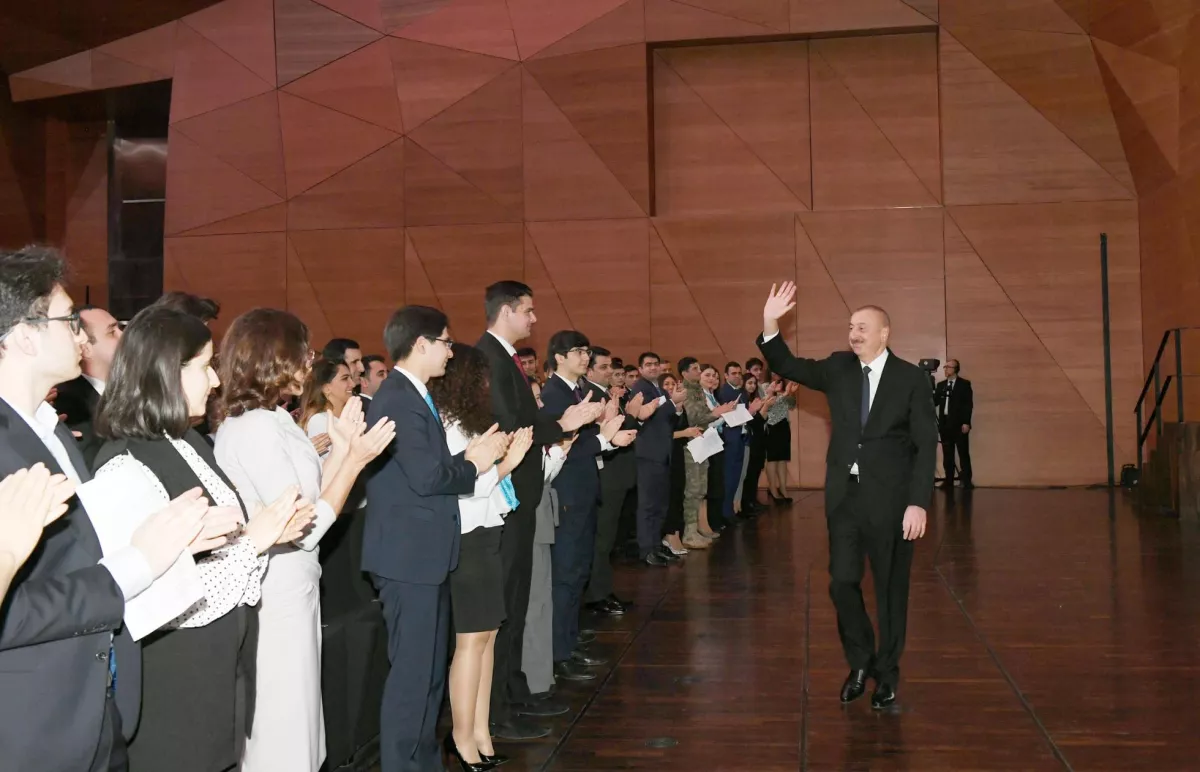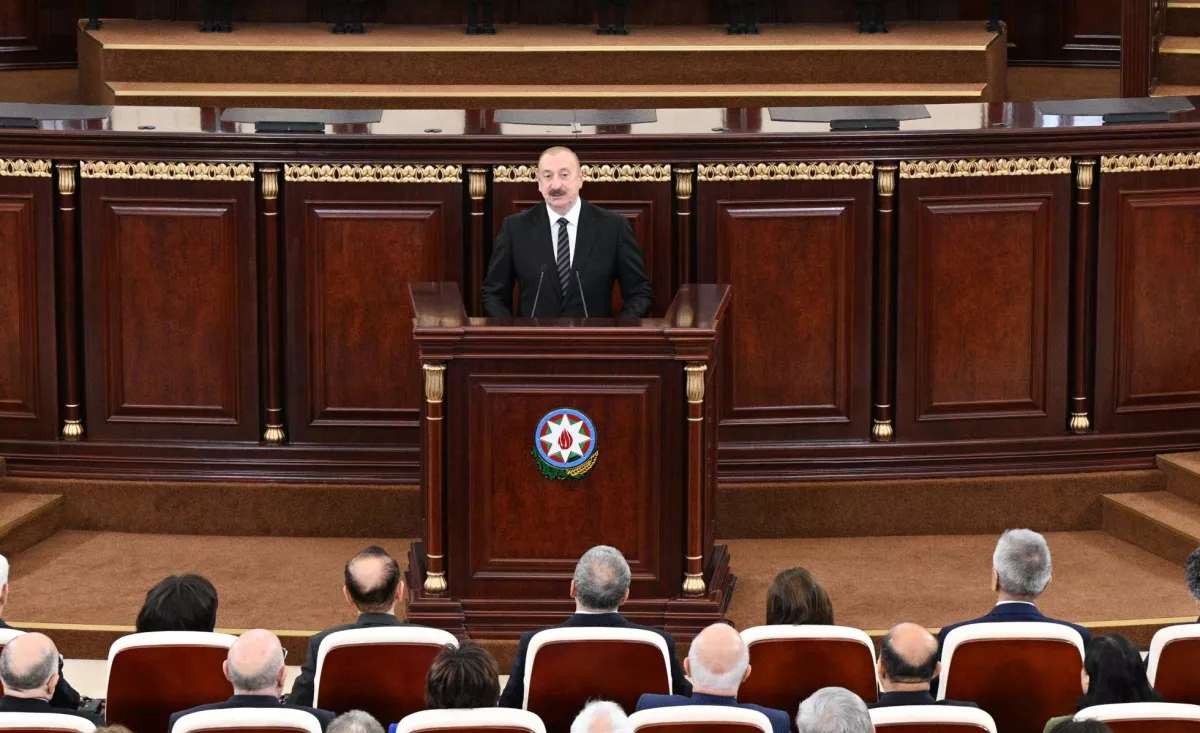If not science, then who? Aliyev sends a clear signal to the academic community
In Azerbaijan, discussions about science rarely stay confined to protocol or formal anniversary phrases. This time was no exception. In his speech marking the 80th anniversary of the National Academy of Sciences, Ilham Aliyev went beyond mere congratulations, outlining clear political and strategic priorities.
Science is seen as a field where issues of security, the economy, technology, and cultural identity are addressed. This point was conveyed calmly, consistently, and with well-reasoned arguments. The President reminded the audience that attention to science is not a recent phenomenon—it was initiated long before Azerbaijan regained independence, under the leadership of national leader Heydar Aliyev: “Back in the 1970s, the activities of the Academy were improved under his leadership: several new research institutions were set up, and major funds were allocated for the development of science.”
It was during that period that Azerbaijan succeeded in forming its own scientific school. Hundreds of thousands of young specialists sent to leading universities across the Soviet Union returned with experience and knowledge, effectively creating a national intellectual elite. Ilham Aliyev emphasised: “We are pursuing the same policy in the years of independence as well. Today, tens of thousands of Azerbaijani youth are receiving education in leading universities of the world. The vast majority of them study and return to their homeland, thus making a valuable contribution to the development of our country.”
In other words, continuity is not merely a declaration—it is a real, functioning mechanism.

Even during the country’s most difficult years, science was not forgotten. The treasury was empty, a wave of refugees was arriving—and yet the Academy neither closed nor perished. As the President reminded, “Despite this, funds were still allocated for the Academy to operate, for the protection of the Academy, and for the activities of scientists.”
With the strengthening of the economy, entirely new opportunities emerged. During the years of independence, an infrastructure was developed that had never existed before.
“Many steps have been taken. The material and technical infrastructure of the Academy has been bolstered; the buildings on this academy campus have been renovated. Organizations that were not involved with science and had occupied some of the Academy’s buildings have been removed. A new large library has been built. A new building has been constructed for the National Encyclopedia. As I mentioned, scientific research institutions have been renovated and provided with equipment. The Science Fund was established back in 2009. At that time, the main objective behind establishing the Fund was to provide financial support to Azerbaijani scientists and give impetus to the development of science through grants. The National Strategy for the Development of Science has been adopted. The Law “On Science” was adopted,” emphasised President Aliyev.
This is not merely a list of achievements, but a foundation where scientific potential is transformed into economic and technological results.
However, the main part of the speech was not about the past, but about how science must function today. Azerbaijan has changed, the region has changed, the world has changed—and science must be part of these transformations. The President stated directly: “the development and, at the same time, the security of each country today are determined by the technological capabilities of that country.” This is a key principle. Conclusions about war, security, and the economy are based on facts: armies win not by numbers, but by technology; states grow strong not through natural resources, but through intellectual potential.
For this reason, technological development was highlighted as a priority. Artificial intelligence is not just a buzzword—it is a field of competition between states. Aliyev made the point very clearly: “Today, it is already an integral part of the future development of countries. We should not lag behind here.”
The state provides the conditions, but the President openly demands that scientists engage in real-world processes, not remain confined to “office science.” The same applies to digitalisation. Wherever processes are managed digitally, efficiency, quality, and transparency improve. This is why the Ministry of Digital Development and Transport was established.
A special emphasis was placed on cybersecurity. “Cybersecurity is not virtual security; it is the physical security of each country.” In a world where an attack on a data centre can have consequences comparable to a strike on critical infrastructure, scientists become active participants in national defence. Here again, the call to science is clear: it must be part of practical applications, not isolated theory.
The same applies to the defence industry. In just a few years, Azerbaijan has built a sector that already exports military products. “I can say that this process is still at an early stage, but many Azerbaijani companies will be manufacturing world-class military products in the near future.” This means scientific research must directly support real production. Victory in Karabakh demonstrated that technological superiority and an intellectual approach were decisive. The President noted: “We were among the first to deploy them in combat”—referring to unmanned aerial vehicles. This area now requires a systematic scientific foundation.
Another important focus is geological work on the liberated territories. Soviet-era science did not study this region, but modern technology makes it possible to uncover resources that were previously unknown: “on my instructions, major geological work has been underway in Garabagh and East Zangazur for several months now.” Again, scientists are not mere observers—they are active participants.

The topic of history was presented with strong, well-reasoned arguments. “Our rich history has long been distorted by Armenia and the Armenian diaspora…Therefore, we must counter this with our own truth.” This is not a matter of political debate, but of documented, scientific work. The maps of Tsarist Russia cited by the President serve as direct evidence: “the overwhelming majority of toponyms in what is now Armenia are of Azerbaijani origin. There was no lake Sevan on those maps. There is Lake Goycha on those maps.”
These words reference sources not created by Azerbaijan. That is why Aliyev emphasised: “We did not compile those maps…these maps are based on pure historical truth.” Science becomes a tool for defending the truth—especially when it concerns the return of Azerbaijanis to their historical lands: “We must return to our historical lands — not with tanks, but in cars.”
This is a formula for a peaceful, legally grounded process, not one of force.
A separate focus was on language. Aliyev first spoke about this ten years ago and returned to the topic in his latest address: “Our language is ancient and rich…The preservation of the purity of the Azerbaijani language should be the duty of every Azerbaijani citizen.” The loss of language abroad is a risk that cannot be ignored. “If we do not protect our language, if we do not keep our language clean and pure, then we can eventually lose it.” This is no longer just a matter of philology—it is a matter of national identity. For this reason, the President called on scientists, writers, journalists, and government institutions to act systematically.
The final emphasis of the speech was on confidence—economic, military, and cultural confidence. Azerbaijan possesses financial stability, investment resources, ratings, and other factors of strength that enable independent development. All of this creates a platform on which science ceases to be merely a tradition and becomes a tool for the future.
At the next stage of the country’s development, science must become one of the main players—in technology, security, history, language, geology, energy, and the defence industry. In other words, this is not only about state support for science, but also about science actively responding to the nation’s needs.
Thus, President Aliyev’s address at the National Academy of Sciences was a clear setting of tasks. The state has done its part. Now it is science’s turn. Its role is to contribute to the economy, national security, the country’s international standing, and the preservation of national identity. This is not a matter of wishful thinking—it is a state imperative.








